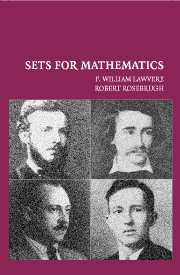
-
Select format
-
- Publisher:
- Cambridge University Press
- Publication date:
- 06 July 2010
- 20 January 2003
- ISBN:
- 9780511755460
- 9780521804448
- 9780521010603
- Dimensions:
- (247 x 174 mm)
- Weight & Pages:
- 0.65kg, 276 Pages
- Dimensions:
- (247 x 174 mm)
- Weight & Pages:
- 0.498kg, 276 Pages
- Subjects:
- Mathematics, Logic, Categories and Sets
You may already have access via personal or institutional login- Subjects:
- Mathematics, Logic, Categories and Sets
Book description
Advanced undergraduate or beginning graduate students need a unified foundation for their study of geometry, analysis, and algebra. This book, first published in 2003, uses categorical algebra to build such a foundation, starting from intuitive descriptions of mathematically and physically common phenomena and advancing to a precise specification of the nature of Categories of Sets. Set theory as the algebra of mappings is introduced and developed as a unifying basis for advanced mathematical subjects such as algebra, geometry, analysis, and combinatorics. The formal study evolves from general axioms which express universal properties of sums, products, mapping sets, and natural number recursion. The distinctive features of Cantorian abstract sets, as contrasted with the variable and cohesive sets of geometry and analysis, are made explicit and taken as special axioms. Functor categories are introduced in order to model the variable sets used in geometry, and to illustrate the failure of the axiom of choice. An appendix provides an explicit introduction to necessary concepts from logic, and an extensive glossary provides a window to the mathematical landscape.
Reviews
"...the categorical approach to mathematics has never been presented with greater conviction than it has in this book. The authors show that the use of categories in analyzing the set concept is not only natural, but inevitable." Mathematical Reviews
"To learn set theory this way means not having to relearn it later.... Recommended." Choice
Contents
Metrics
Altmetric attention score
Full text views
Full text views help Loading metrics...
Loading metrics...
* Views captured on Cambridge Core between #date#. This data will be updated every 24 hours.
Usage data cannot currently be displayed.
Accessibility standard: Unknown
Why this information is here
This section outlines the accessibility features of this content - including support for screen readers, full keyboard navigation and high-contrast display options. This may not be relevant for you.
Accessibility Information
Accessibility compliance for the PDF of this book is currently unknown and may be updated in the future.


